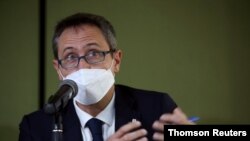The International Red Cross and Red Crescent Movement says there are “deep and pervasive” inequities in how the world is responding to the coronavirus pandemic.
Not surprisingly, the group says the inequities are more pronounced in countries “affected by humanitarian crises.”
“Countries that are not dealing with humanitarian crises have reported carrying out nearly 48 times more COVID-19 tests per capita than countries facing ‘severe’ or ‘very severe’ humanitarian crises,” the group said in a news release.
The group added that people in countries with no or low levels of humanitarian crises are “more than three times as likely to be supported with contact tracing for COVID-19.”
Less than 2% of the COVID-19 vaccine has been administered in the 32 countries facing “severe” or “very severe” humanitarian crises, the group said.
For example, the group says that in Asia, nearly two-thirds of the vaccines administered have been in the most developed countries, including Singapore, Japan, Republic of South Korea, Australia and Thailand.
Only 4% of the vaccines administered have been in Afghanistan, Bangladesh, Myanmar, Pakistan and North Korea.
“Communities affected by armed conflict have been among the hardest hit by COVID-19, including those who have been displaced, people separated from their families, those deprived of their livelihoods and people in detention,” said Robert Mardini, Director-General of the International Committee of the Red Cross, in a statement.
“That is why the ICRC is supporting National Societies, vital health infrastructure, access to health care, efforts to prevent the spread of disease in places of detention, access to clean water, and the safe and dignified management of human remains in places experiencing conflict and violence.”
To address the inequities, the International Red Cross and Red Crescent Movement says it will expand “care, treatment and support for people in all countries, including those affected by humanitarian crises such as conflict and disasters.”
The plan, the group says, is “designed to support and extend COVID-19 immunization campaigns so that marginalized and isolated groups – including people living in conflict zones, migrants and displaced people, people living in urban slums, and isolated communities in non-crisis affected countries – can access vaccines.”
The group is seeking $3 billion to finance the plan, Reuters reported.
“A top concern of ours is ensuring equitable access to vaccines, and particularly for people in conflict-affected areas. An estimated 65 million people live in areas controlled by non-state armed groups – people excluded from basic state services like health care,” Mardini said. “They deserve to be vaccinated – from COVID-19 and all preventable diseases. It keeps them safe and helps keep the rest of the world safe, too.”
Red Cross Red Crescent Movement Notes ‘Deep and Pervasive’
- By VOA News







